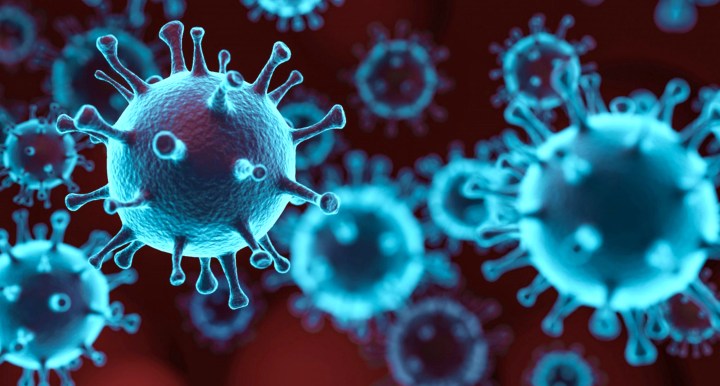CORONAVIRUS
Fourth wave infections ‘stabilised’ — and experts say no new Covid-19 variant in sight

South Africa’s fourth wave of coronavirus infections seems to have stabilised, with fewer deaths and severe infections than previously seen, the National Institute for Communicable Diseases said on Wednesday as the National Department of Health published new draft regulations for the control of future outbreaks.
The number of new cases of coronavirus infections detected in South Africa had decreased by 18.1% (8,867 cases) since last week and the fourth wave “seems to have stabilised”, Dr Michelle Groome from the National Institute for Communicable Diseases (NICD) said on Wednesday.
She said Gauteng still had the highest number of new cases with 3,187, followed by the Western Cape, but provinces across the board were reporting a decrease in cases.
The health districts with the highest proportion of positive tests in the country are: Randfontein in Gauteng, Karoo Hoogland in Williston in the Northern Cape, the Swartland district in the Western Cape, the Tswelopele district around Bultfontein in the Free State, the Theewaterskloof district in the Western Cape, the Breede Valley in the Western Cape, Cape Agulhas in the Western Cape, the Nala district around Bothaville in the Free State, Saldanha Bay in the Western Cape, the Witzenberg district around Ceres in the Western Cape and the original site of the Omicron outbreak, the Tshwane district in Gauteng.
Outbreaks triggered by the full-time return of learners to school had also settled, Groome said.
The Western Cape still has the highest incidence risk (32.5/100,000) with Gauteng at 20.2 cases per 100,000 while all the other provinces have incidence risks of lower than 15 per 100,000.
The country has also come down from a test positivity rate that peaked at 37% at the end of last year (meaning 37% of people who were tested, tested positive) and now all the provinces except the Western Cape have test positivity rates of below 10%. The Western Cape still has a positivity rate of 12%.
An NICD analysis of test results showed that the largest group testing positive for coronavirus infections were children and teenagers.
The World Health Organization (WHO) has set a test positivity rate of 5% as the target for an outbreak to be over.
Groome confirmed that globally, despite much larger fourth waves of infection driven by the extremely transmissible Omicron variant, there were far fewer deaths. She said there were currently outbreaks of Omicron infections in the Western Pacific Region (including Hong Kong, China and Singapore).
“There are no new variants at this stage, but we are keeping a close watch,” Groome said.
She said global data showed that Omicron is the dominant variant globally, with 99% of cases linked to one of the two subvariants and “just a bit of Delta” still around.
The WHO, after its most recent technical meeting on Covid-19, announced that variants of concern like the Beta variant, and the Gamma variant (which had no significant presence in South Africa) would be referred to as “previously circulating”, while the Omicron variants and the Delta variant would be referred to as “currently circulating”.
New regulations
On Wednesday, the National Department of Health published new draft regulations for the continued control of the pandemic for public comment. The regulations will be part of the National Health Act.
Highlights of the new draft regulations include:
- Travellers must still present a negative PCR test not older than 72 hours if they do not have a full vaccination certificate;
- There are still restrictions on night vigils and after-funeral gatherings;
- Restrictions on indoor and outdoor gatherings are set at 50% of venue capacity if participants have vaccine certificates, wear masks and maintain social distancing; and
- The attendance of indoor gatherings without proof of vaccination will be limited to only 1,000 people and 2,000 for outdoors, with physical distancing of at least 1m.
The regulations further stipulate that all information used for contact tracing will be de-identified and personal information in these registers must be destroyed within six weeks of the National State of Disaster being lifted.
The mask mandate for indoor spaces and public transport remains, as do regulations for the sanitising of hands at the doors of business premises and shops.
The new regulations further require compulsory medical screening for people with elevated temperatures exiting or entering the country. People who present with a fever and test positive for the SARS-CoV-2 virus will have to apply for “self-quarantine” and if refused could be sent to state quarantine facilities.
Temperature screening for local flights will also be reintroduced, according to draft regulations.
Like interim regulations currently in place, the regulations make provision for the forced hospitalisation and testing of infected people refusing testing and treatment. DM/MC
"Information pertaining to Covid-19, vaccines, how to control the spread of the virus and potential treatments is ever-changing. Under the South African Disaster Management Act Regulation 11(5)(c) it is prohibited to publish information through any medium with the intention to deceive people on government measures to address COVID-19. We are therefore disabling the comment section on this article in order to protect both the commenting member and ourselves from potential liability. Should you have additional information that you think we should know, please email [email protected]"



 Become an Insider
Become an Insider